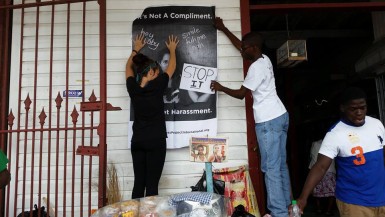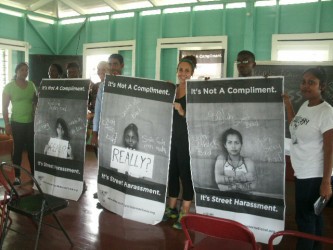Collaborating with Peace Corps Volunteers, Witness Project International on Tuesday widened its campaign against street harassment to Berbice.

The campaign, funded by the Margaret Clemons Foundation (a New York-based non-profit organisation), was launched earlier in the year.
It aims to raise awareness of the issue of violence being directed towards women and girls in the form of harassment on the streets and to inform men that it is unacceptable behaviour to call out to women about their body parts on the road and make lewd sexual advances.
Since conceptualising the campaign in July of 2014, Witness Project has been working towards using photography and marketing to bring the issue of street harassment to the front burner in the discussion of gender-based violence. Towards this end, posters discouraging street harassment in every form are being erected at strategic locations around the country and the group is hosting a series of public discussions.
One such discussion was held at the New Amsterdam Prison Officers’ Club on Tuesday. Those who attended included Peace Corps Volunteers, prison officers and inmates of the prison, representatives of the ‘B’ Division Police, school teachers, media operatives and members of the community.

Witness Project International works primarily with youths and the group’s mandate is to give women and girls a voice and to empower them and to speak out against violence against women and violence directed towards children. Explaining the genesis of the campaign, Programme Director Rosheni Takechandra said, “The youths in our project realised that this [street harassment] is an issue; that they are coming to meetings and they are going home and they realized women are constantly being called out, being told about their body part, and so they decided that this is what our next project was going to be.”
The idea is not merely to highlight an issue that has plagued women for centuries, but “to allow women and girls to speak out about this issue; to give them a voice,” she added. The group has thus decided to use photography and employ several marketing strategies to address the issue. “Our target then was to plan to influence the bystander and perpetrator and to empower the victims of this kind of behaviour and so now we have huge three feet by five feet posters of a model who is telling her story,” Takechandra stated.
These posters have so far been erected in regions 2, 3, 4, 10 and now 6.
While it is hard to gauge the impact the campaign has had so far, Takechandra said they are encouraged to continue by “the fact that more and more people are bringing it open in the communities and a lot of people are feeling empowered to come forward and speak out about this form of harassment.”
Mixed responses
So far, the campaign has received mixed responses from men. On the one hand, “you have men who find this to be very disgusting, very distasteful and they tell you this is not something they promote or support; this is not something they would like directed at their wife or children and they view it as inappropriate,” she noted. On the other hand, however, “there are also those men who are like, ‘I don’t see a problem with this? What’s wrong if I see a girl and she look sexy and I tell her?’ Those are like some of the comments and we had other comments like, ‘So, if I can’t talk to women I must become gay and talk to men?” she revealed.
Although it is worrying that some men still find nothing wrong with such behaviour, the Takechandra said she is happy the campaign is getting feedback and that this is a clear indication that it has been successful in starting the discussion on street harassment. She went on to acknowledge that it would probably be years before real tangible signs of the campaign’s success are seen, as it will take a behavioural change in society to curb such a practice. “Women have been socialised to these affirmations from men to speak to their values; so, when a man tells them that they are beautiful and they look good, then they believe that they are beautiful and this is because of the culture and the system they have been socialised with,” she argued. This, she said, will have to gradually change, and this is why the campaign will be ongoing. “With an issue like this, and with any issue you don’t have change overnight; it takes a very long time to change a pattern of behaviour. It’s a very long process of education and reflection,” she noted.
Since its launch earlier this year, the group has received a lot of support from the community. “Groups are opening up their spaces, they are providing walls and we don’t have to pay for those. People are coming forward and say look use my transportation and things like that,” Takechandra disclosed.





